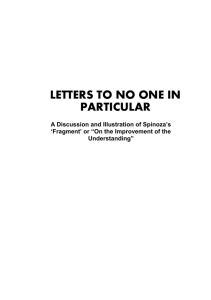Worksheet
advertisement
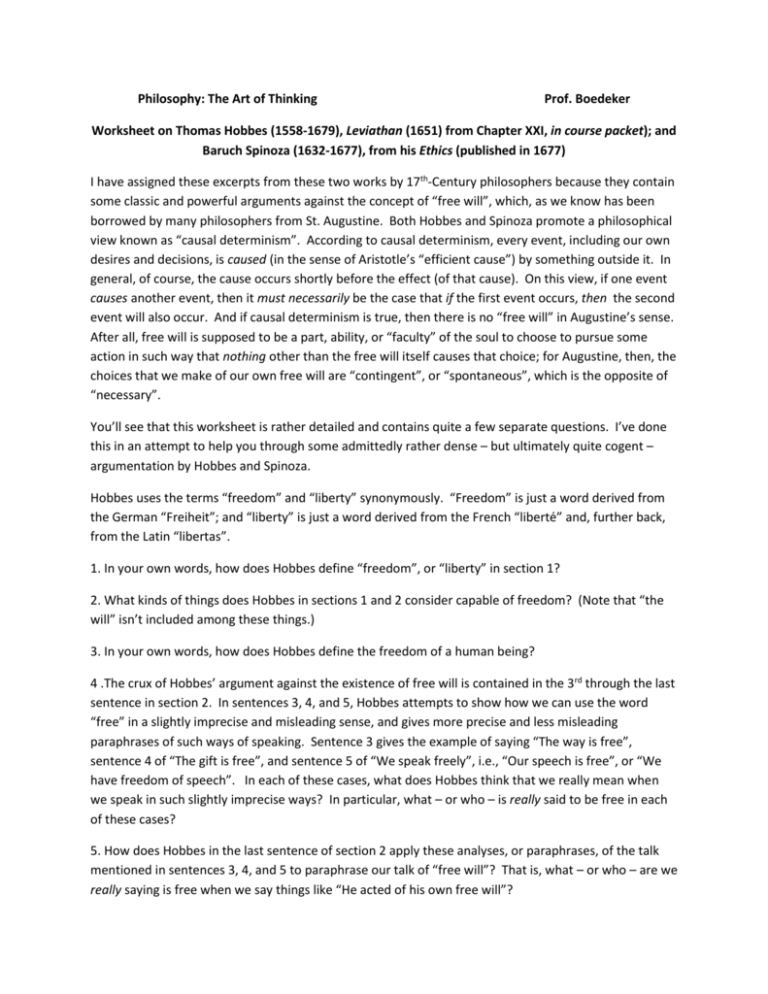
Philosophy: The Art of Thinking Prof. Boedeker Worksheet on Thomas Hobbes (1558-1679), Leviathan (1651) from Chapter XXI, in course packet); and Baruch Spinoza (1632-1677), from his Ethics (published in 1677) I have assigned these excerpts from these two works by 17th-Century philosophers because they contain some classic and powerful arguments against the concept of “free will”, which, as we know has been borrowed by many philosophers from St. Augustine. Both Hobbes and Spinoza promote a philosophical view known as “causal determinism”. According to causal determinism, every event, including our own desires and decisions, is caused (in the sense of Aristotle’s “efficient cause”) by something outside it. In general, of course, the cause occurs shortly before the effect (of that cause). On this view, if one event causes another event, then it must necessarily be the case that if the first event occurs, then the second event will also occur. And if causal determinism is true, then there is no “free will” in Augustine’s sense. After all, free will is supposed to be a part, ability, or “faculty” of the soul to choose to pursue some action in such way that nothing other than the free will itself causes that choice; for Augustine, then, the choices that we make of our own free will are “contingent”, or “spontaneous”, which is the opposite of “necessary”. You’ll see that this worksheet is rather detailed and contains quite a few separate questions. I’ve done this in an attempt to help you through some admittedly rather dense – but ultimately quite cogent – argumentation by Hobbes and Spinoza. Hobbes uses the terms “freedom” and “liberty” synonymously. “Freedom” is just a word derived from the German “Freiheit”; and “liberty” is just a word derived from the French “liberté” and, further back, from the Latin “libertas”. 1. In your own words, how does Hobbes define “freedom”, or “liberty” in section 1? 2. What kinds of things does Hobbes in sections 1 and 2 consider capable of freedom? (Note that “the will” isn’t included among these things.) 3. In your own words, how does Hobbes define the freedom of a human being? 4 .The crux of Hobbes’ argument against the existence of free will is contained in the 3rd through the last sentence in section 2. In sentences 3, 4, and 5, Hobbes attempts to show how we can use the word “free” in a slightly imprecise and misleading sense, and gives more precise and less misleading paraphrases of such ways of speaking. Sentence 3 gives the example of saying “The way is free”, sentence 4 of “The gift is free”, and sentence 5 of “We speak freely”, i.e., “Our speech is free”, or “We have freedom of speech”. In each of these cases, what does Hobbes think that we really mean when we speak in such slightly imprecise ways? In particular, what – or who – is really said to be free in each of these cases? 5. How does Hobbes in the last sentence of section 2 apply these analyses, or paraphrases, of the talk mentioned in sentences 3, 4, and 5 to paraphrase our talk of “free will”? That is, what – or who – are we really saying is free when we say things like “He acted of his own free will”? 6. In the remaining sections of this selection, Hobbes argues for a thesis that might sound paradoxical at first. This is that freedom and necessity (i.e., causal determinism) are consistent. In other words the very same thing, such as a human being, at the very same time, can be both free and constrained by causal laws, which necessitate that every event is caused by some previous event. How does he view this as possible? Questions 7-9 are about Spinoza’s Ethics, and Part I: Concerning God, Proposition 17, its two Corollaries and its “Scholium” (= “Note”: pp. 558-559 in Cahn textbook). 7. What ultimately causes everything that happens in nature, including our own choices and actions (Corollary 1 to Prop. 16 and Corollary 1 to Prop. 17)? 8. Spinoza definitely thinks that God is free (Prop. 17, especially Corollary 2), but he defines “freedom” as follows: “That thing is said to be free which exists solely from the necessity of its own nature, and is determined to action by itself alone” (Definition 7 on p. 551). So in what sense is God free? 9. In the Scholium (= Note) to Prop. 17, Spinoza goes into more detail about his argument that, although God the only ‘thing’ that’s absolutely free, God nevertheless doesn’t have free will. Ultimately, Spinoza’s argument relies on attributing not just the perfections of omniscience and omnipotence to God, but also the perfection of unity. From this it follows that God’s unlimited knowledge and unlimited power are identical to each other. How does this imply that God doesn’t have free will? Questions 10-14 are about Spinoza’s Ethics, Part I: Concerning God, Propositions 32 and 33 (including Scholium 1 and Scholium 2 to proposition 33) through the end of Part I, especially the Appendix (pp. 564-570 in Cahn textbook). Throughout this passage, Spinoza argues that will – even God’s perfect, omnipotent will – isn’t free in Augustine’s sense, but rather that its actions are necessitated through causal laws, which are ultimately known and enforced by God. 10. As we have seen, Spinoza denies God has free will in Augustine’s sense, i.e., that he could have done things differently than he in fact did. What’s Spinoza’s argument, especially in Scholium 2 to Prop. 33 (pp. 565-566) for this thesis? 11. In the first 5 paragraphs in Appendix to Book I: Concerning God (pp. 567-568), Spinoza argues for a thesis (which he breaks down into two points) that’s distinct from, but loosely related to, his thesis that there’s no such thing as “free will”. This is that the common view is false that God directs the universe toward an ultimate end, purpose, or final cause (in Aristotle’s sense), and that this is ultimately for the sake of us humans. In your own words, what’s Spinoza’s argument against the notion that God acts for some future goal? 12. Paragraphs 6 (pp. 568-569) of the Appendix are particularly interesting. Here, Spinoza gives a kind of “diagnosis”, or psychological explanation, of why some people are inclined to believe that God benevolently directs the universe to a future goal that’s good for us. He somewhat sarcastically attributes not an argument that’s not a reduction ad absurdum (in which a premise is shown to be false because it entails a contradiction), but “a reduction to ignorance” (in the last few lines on p. 568). What is this explanation, in your own words? 13. Explain in your own words Spinoza’s view, given in paragraph 7 (p. 569), of how we can remove our false belief that God benevolently directs the universe to a future goal that’s best for us humans. 14. In the remaining paragraphs (8-12) of the Appendix Spinoza argues that it’s simply confusion on our part, produced by our over-active imagination, that there is really good, bad, order, confusion, etc.in the universe. How does he think we come up with such confused notions and beliefs?
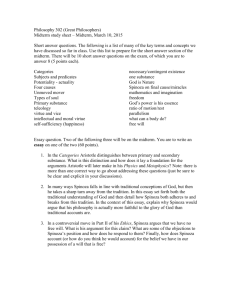
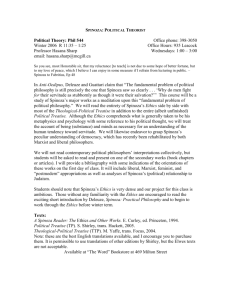
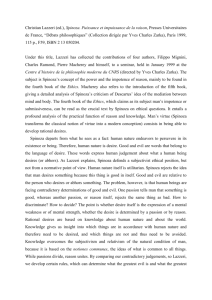
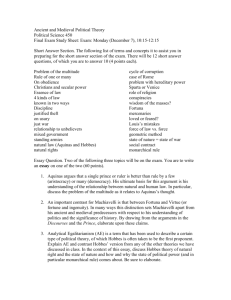

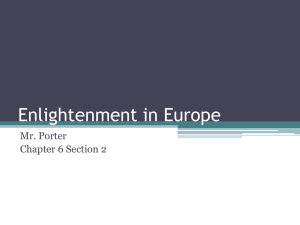
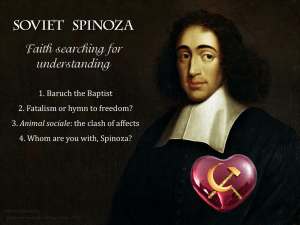
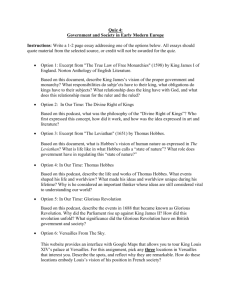
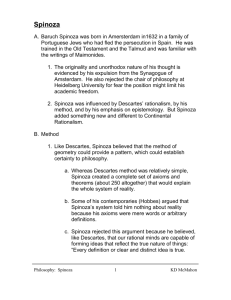
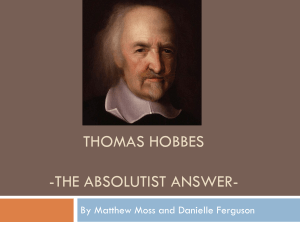
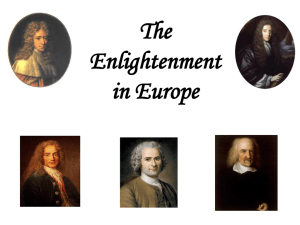
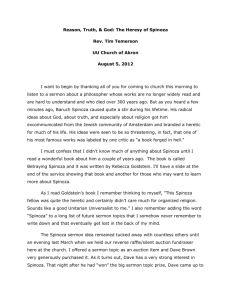
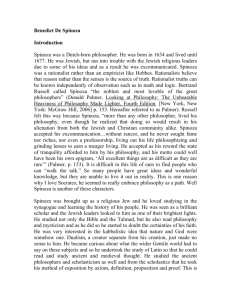
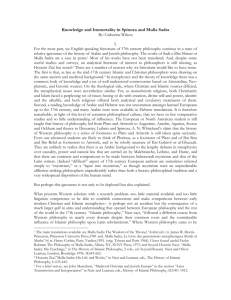
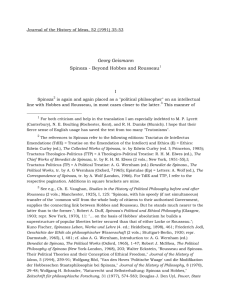
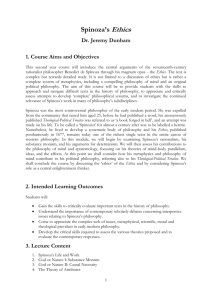
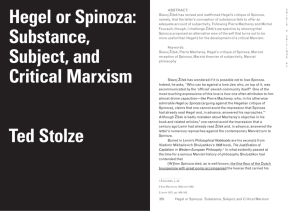
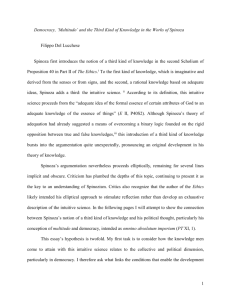
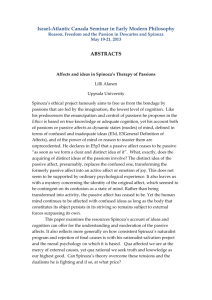
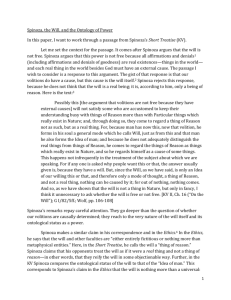
![Spinozistic Moral Imperatives [draft of a draft of a draft] Michael](http://s3.studylib.net/store/data/007162147_2-65eda3573329700cc44fcad90f1a3110-300x300.png)
